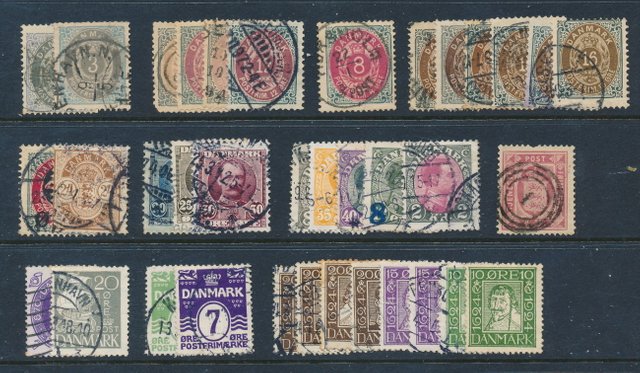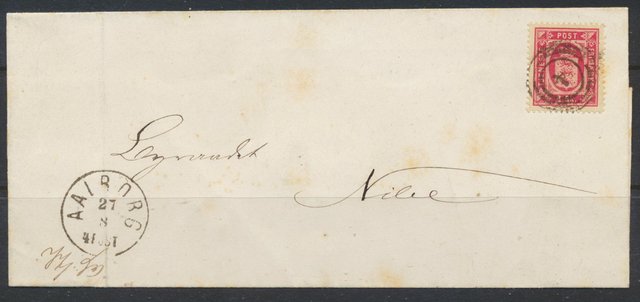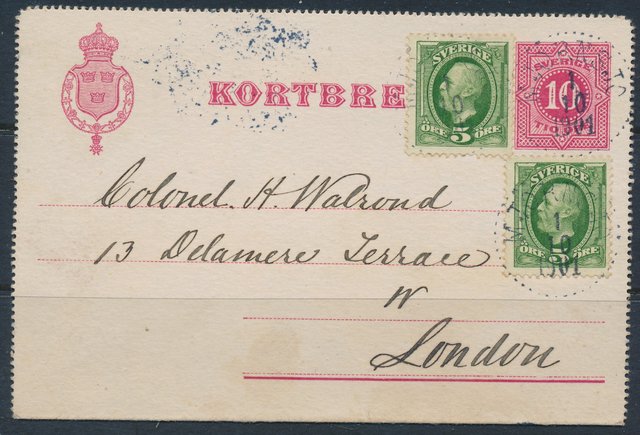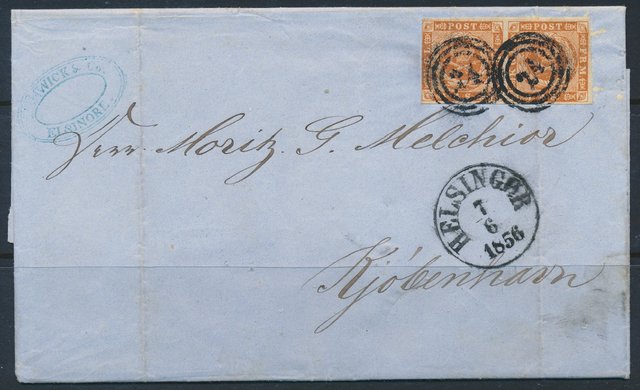Those of you who have followed this blog for some time might remember that one of the ways I earn a living is by being a trader/dealer in old postage stamps and paper collectibles.

Some old stamps from my native Denmark
All in all, it's a fairly rewarding thing to be doing, and I'm very grateful to be able to take one of my hobbies that I've been interested in since childhood and turn it into a part-time occupation and income source.
Where as most of what I do is pretty fun — and there's a certain "treasure hunt" element to buying and selling old stamps and paper collectibles which really appeals to me — some of the people I deal with are a little bit strange and sometimes outright frustrating to interact with.
That is to say, they are highly inconsistent in their thinking, while insisting that I (as the ostensible "expert") have no idea what I'm doing.

An old letter from the 1870's
The Art of the Deal
Now, I like to get a good deal as much as the next person, but at the same time I have a pretty realistic grip on what things are worth. By "worth" I mean their true market value.
A fair number of collectors, however, live in their own version of Fantasyland!
Fantasyland is a place where their perceived value of their collections exceed actual market price by a huge margin, while the amount they are willing to pay for anything is always substantially less than market price.
Unfortunately, this often sets them up for disappointment, and sometimes outright anger because they believe that when the time comes to sell their precious collections people are trying to rip them off because they can't seem to get any offers that match their highly inflated price.

A Swedish postal card from 1901
What generally happens is that some collector will refuse to buy a more valuable item for their collection until they can get it for a tiny fraction of the going price, and when they finally do it's usually because there's something slightly wrong with the item: maybe it has a defect or it's faded or it's been used too much. But when they come to sell, the "comparable" they use to set their price is not for "a slightly worn and defective" item but for an item in total mint condition... and then they're upset when nobody will offer them the mint condition price for something that is in lousy condition.
In extreme cases, they start bad-mouthing the entire hobby because things didn't turn out the way it was "supposed to," according to their fantasy which — let's remember — had nothing to do with reality!
The problem is sometimes made worse by the fact that there are many "Collector Catalogs" out there that help give people a sense of value of their collection.

A letter posted in 1856
Certainly, you can look something up in the catalog and get a sense of what book value is. But if you read the catalog appropriately you'll also find the very detailed description of what sort of condition and quality the prices listed are indicated for.
And you're not going to get the "mint in original box" price for an item your grandkids have kicked around your yard in the dirt for six years! But some people simply don't get that... or they don't want to get it.
Thanks for stopping by, and have a great remainder of your week! And to my friends in the USA, a very Happy Thanksgiving!
How about you? Do you collect anything? Do you do it just for fun, or are you also concerned with the VALUE of your collection? Have you ever tried to SELL anything from your collection? Leave a comment if you feel so inclined — share your experiences — be part of the conversation!
(All text and images by the author, unless otherwise credited. This is ORIGINAL CONTENT, created expressly for this platform — Not posted elsewhere!)
Created at 2023.11.22 23:12 PST
x652/1887
I used to enjoy going to stamp & coin shows back in high school, but I was never a seller, and I could never afford to buy the stuff that I really wanted. This was probably a good thing, since I had no skill at evaluating the condition of the stamps or coins. Now, I haven't been to a show in decades. I definitely remember that this is true, however:
When estimating my own collection's value, any time I wasn't sure, I always wanted to assume that the stamp or coin was in the better of two (or three) possible conditions.
Downvoting a post can decrease pending rewards and make it less visible. Common reasons:
Submit
Being a collector is something that should be done uprightly. There are some collectors who wants to buy coins at a very cheap price and in that process, they go for coins that are less valuable. If they go for coins like that, it is either they are not able to make so much profit or no profit at all from it or they may not even be able to sell it or trade it again.
I’m saying that because no one will ever want to buy a coin that is not valuable. Everyone wants to invest money in something that they can always make money from she that is why it is good to stack up good ones
Downvoting a post can decrease pending rewards and make it less visible. Common reasons:
Submit
Cool visuals - this is exactly the stuff I was into in my teen years (I was collection stamps of the colonies from all over the world, from the beginning of the XX century to WW2).
Read your opinion with a huge intrest!
What I can say?
'Buy for cheap, sell at max' is _the basic and main law of retail trade', so... one cannot be frustrated at poor collectioneers for that.
And.... speaking about the 'invisible but wise Hand of the Market' that 'determines the true price' ... well, see, in the 2000s I was buying a lot of old papers on eBay; not as old as your letters and stamps, literally stuff from the 90s, newspaper and magazine clippings, promotional photographs etc. At least in this narrow and certain field, I have got an objective picture in its dynamics.
Here it is: b.s.! looking at the current eBay prices, I just smile and think something like this: “Crazy people!”... Yes, everyone wants easy money in exchange for nothing... its very easy to understand that.
Downvoting a post can decrease pending rewards and make it less visible. Common reasons:
Submit